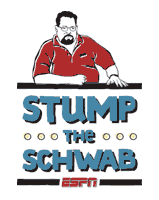Bognor or Bust is a 2004 UK television panel game, on the subject of news and current affairs. Produced by 4DTV for ITV, the show conventionally gave contestants the opportunity to win prizes, yet was comedic in style. It combined members of the public and celebrities on the same panel.

Beat the Geeks is an American television game show that aired on Comedy Central from 2001 to 2002. The show was rerun on The Comedy Network in Canada.

Winning Lines was a National Lottery game show that was broadcast on BBC One from 12 June 1999 to 16 October 2004. It was originally hosted by Simon Mayo and then by Phillip Schofield.

Stump the Schwab is an American game show that aired on ESPN2 and ESPN Classic from July 8, 2004 to September 29, 2006. The show featured three contestants trying to defeat Howie Schwab, ESPN's first statistician, in a sports trivia contest. Stuart Scott was the show's host. The show also appeared on Canada's The Score Television Network.
Going for Gold is a British television game show that originally aired on BBC1 between 12 October 1987 and 9 July 1996. It was revived for Channel 5 from 13 October 2008 to 20 March 2009.

Jet Set was a BBC National Lottery game show which was broadcast on BBC One from 20 January 2001 to 8 August 2007. It was hosted by Eamonn Holmes.
It's Academic is an Australian children's game show which is based on the long-running American version of It's Academic, and pits students from different schools against each other in a test of knowledge covering a number of diverse subjects including English, mathematics, science, geography, sport, music and popular culture.
Fandango is a country music-themed quiz show which aired on The Nashville Network from March 8, 1983 to August 26, 1988, with reruns airing through March 31, 1989, when it was replaced by Top Card. Fandango was the first TV game show to air on TNN and was one of the longest-running game shows on a cable network.
Connections is a British game show, devised and produced by John Huntley, that aired on ITV from 26 April 1985 to 6 June 1990. The daytime version is hosted by Sue Robbie from 1985 to 1988 and Simon Potter from 1989 to 1990, while the primetime version is hosted by Richard Madeley.

Miljoenenjacht, officially Postcode Loterij Miljoenenjacht, is a Dutch game show, sponsored by the country's postcode lottery, where a contestant and at-home viewer could win up to €5,000,000 or as little as €0.01. The show is broadcast at various times, spanning across six episodes for each set. The program was originally shown by TROS on NPO 2, but moved to creator John de Mol's channel Tien in 2005. After the channel was discontinued after its sale to the RTL Group, the program moved to RTL 4. In 2019, the program moved to SBS6 due to the transfer of Linda de Mol from RTL to SBS.
Blokken (Blocks) is a Belgian quiz show based on the video game Tetris. It is broadcast by één and hosted by Belgian television personality Ben Crabbé. The show is the longest running quiz show on Belgian television, with 22 seasons. On 10 December 2017 the show aired its 5000th episode.
WinTuition is an American game show created as an original series for Game Show Network, on which it originally ran from December 9, 2002 to April 1, 2003, with repeats until January 4, 2004. The game had a school-oriented theme in which three contestants competed to answer questions on general school-based subjects in an attempt to win a $50,000 college fund, hence the name of the show. The show was hosted by Marc Summers and announced by Burton Richardson. Henry Winkler served as the show's executive producer. WinTuition would end up being the final game show that Summers would emcee.
Timekeepers is a British game show that aired on BBC1 from 3 January 1995 to 2 February 1996. It was hosted by Bill Dod.
On the Spot is an American game show produced by and broadcast on KGW-TV in Portland, Oregon as a daily series from September 1984 to October 1988. Newscaster Larry Blackmar was host, while local disc-jockey Michael Bailey announced.
Face the Music was a weekly game show from New Zealand that aired on TV2 from 1992-1994, hosted by TV presenter Simon Barnett, along with Dwayne Francks as co-host. Jeoff Barraclough was the announcer.

Million Dollar Minute is an Australian quiz show which aired on the Seven Network. It premiered on 16 September 2013. The show was originally hosted by Grant Denyer, and later by Simon Reeve, and aired at 5:30 pm on weeknights. The show was cancelled in September 2015 and was replaced by The Chase Australia in its timeslot. Repeats are currently shown on 7TWO in place of Home and Away's Early Years on Hiatus.
Two Tribes is a BBC game show that aired on BBC Two from 18 August 2014 to 31 August 2015, hosted by Richard Osman.
Gefragt – Gejagt (Asked—Chased) is a quiz show that has been broadcast on German television since 2012. It is the German adaptation of ITV's show The Chase.

Cash Trapped is a British game show which began airing on ITV from 1 August 2016. Presented and based on an idea by Bradley Walsh, the show pits contestants against one another in a contest to amass and win prize money by answering questions in various categories.
Takeover Bid is a British game show that aired on BBC1 from 26 May 1990 until 15 July 1991. It was hosted by Bruce Forsyth and assisted by Claire Sutton. The basic premise of Takeover Bid was that of a "reverse game show", where the contestants were given prizes at the beginning of play, and the object of the game was to try and keep them.